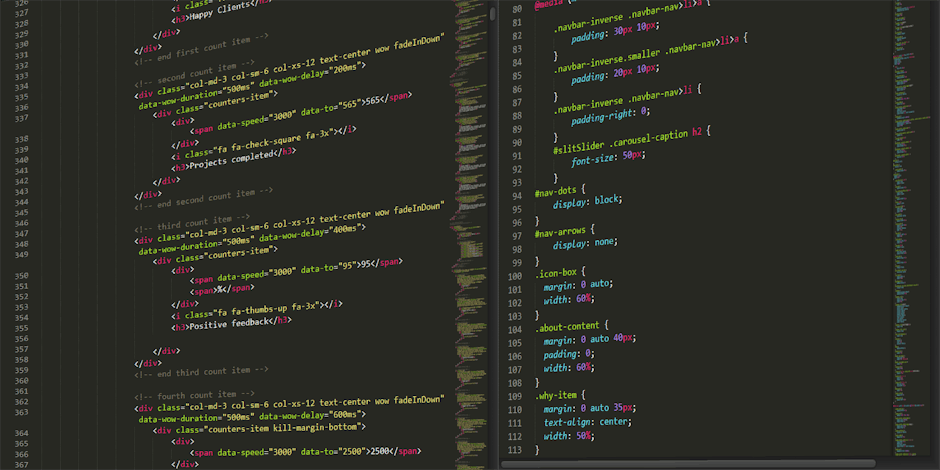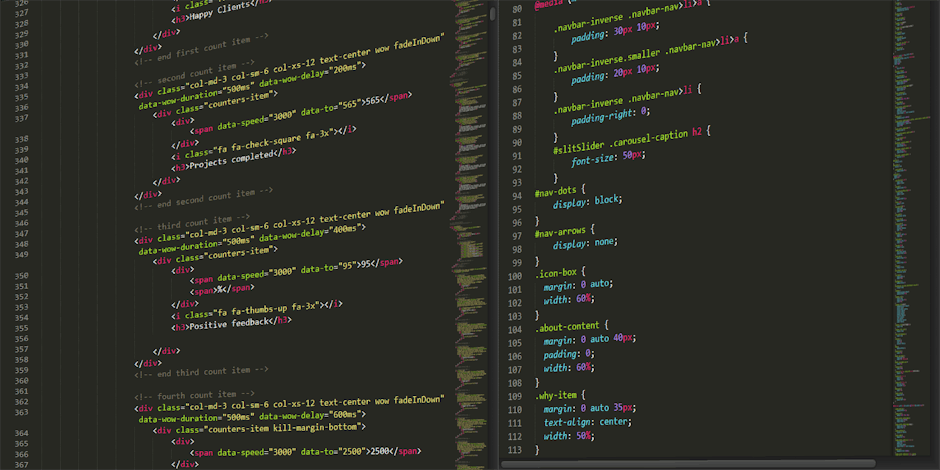Table of Contents
- Introduction
- The Importance of Continuous Feedback for Millennial Employees
- Strategies for Providing Effective Feedback to Millennials
- Utilizing Technology to Enhance Feedback Processes for Millennials
- Creating a Culture of Feedback and Growth for Millennial Workers
- The Role of Mentoring and Coaching in Improving Millennial Performance
- Incorporating Feedback into Performance Reviews for Millennials
- Addressing Challenges and Resistance to Feedback Among Millennials
- Measuring the Impact of Continuous Feedback on Millennial Performance
- Q&A
- Conclusion
“Empowering Millennials to reach their full potential through ongoing feedback.”
Introduction
Introduction:
Enhancing Millennial Performance through Continuous Feedback is a crucial aspect of modern workplace management. Providing regular and constructive feedback to millennials can help improve their performance, engagement, and overall job satisfaction. In this article, we will explore the importance of continuous feedback for millennials and discuss strategies for effectively implementing feedback mechanisms in the workplace.
The Importance of Continuous Feedback for Millennial Employees
In today’s fast-paced and ever-changing work environment, it is essential for organizations to adapt their performance management strategies to meet the needs of their employees. One group that has been particularly vocal about their desire for more frequent feedback is millennials. Born between 1981 and 1996, millennials have grown up in a world where instant gratification and constant communication are the norm. As a result, they crave feedback on a regular basis to help them improve and grow in their careers.
Research has shown that millennials respond well to continuous feedback, as it allows them to make adjustments in real-time and stay on track with their goals. Traditional annual performance reviews are no longer effective for this generation, as they often feel disconnected from their work and unsure of how they are performing throughout the year. By providing ongoing feedback, managers can help millennials stay engaged and motivated, leading to higher levels of performance and job satisfaction.
One of the key benefits of continuous feedback is that it fosters a culture of open communication within the organization. When employees receive feedback on a regular basis, they are more likely to feel comfortable sharing their thoughts and ideas with their managers. This can lead to increased collaboration and innovation, as employees feel empowered to contribute to the success of the organization.
Additionally, continuous feedback allows for more personalized development opportunities for millennials. By receiving feedback on a regular basis, employees can identify areas for improvement and work with their managers to create a plan for growth. This tailored approach to development can help millennials reach their full potential and achieve their career goals.
Another advantage of continuous feedback is that it helps to build trust and strengthen relationships between managers and employees. When feedback is given in a timely and constructive manner, employees are more likely to see their managers as mentors and coaches rather than critics. This can lead to increased loyalty and retention, as employees feel supported and valued in their roles.
In order to implement a successful continuous feedback program, organizations must provide managers with the tools and training they need to deliver feedback effectively. This includes teaching managers how to give feedback in a constructive and actionable way, as well as how to have difficult conversations when necessary. It is also important for organizations to create a culture that values feedback and encourages open communication at all levels.
Overall, continuous feedback is a powerful tool for enhancing millennial performance in the workplace. By providing regular feedback, organizations can help millennials stay engaged, motivated, and on track with their goals. This approach not only benefits the individual employee but also contributes to the overall success of the organization. As the workforce continues to evolve, it is essential for organizations to adapt their performance management strategies to meet the needs of their employees. Continuous feedback is a key component of this evolution and can help organizations attract, retain, and develop top millennial talent.
Strategies for Providing Effective Feedback to Millennials
In today’s fast-paced and ever-evolving work environment, providing feedback to employees, especially millennials, is crucial for their growth and development. Millennials, born between 1981 and 1996, make up a significant portion of the workforce and have unique characteristics that require a different approach to feedback. Traditional annual performance reviews are no longer effective in providing timely and relevant feedback to this generation. Instead, continuous feedback has emerged as a more effective strategy for enhancing millennial performance in the workplace.
Continuous feedback involves providing ongoing, real-time feedback to employees on their performance, behavior, and development. This approach allows for immediate course correction, recognition of achievements, and alignment of goals between employees and their managers. Millennials, who value transparency, collaboration, and instant gratification, respond well to continuous feedback as it helps them stay engaged, motivated, and focused on their goals.
One of the key benefits of continuous feedback is its ability to address issues as they arise, rather than waiting for an annual review. This proactive approach allows managers to provide timely guidance and support to millennials, helping them improve their performance and reach their full potential. By receiving feedback on a regular basis, millennials can make adjustments to their work habits, behaviors, and skills, leading to continuous growth and development.
Another advantage of continuous feedback is its impact on employee engagement and retention. Millennials are known for seeking meaningful work, opportunities for growth, and a supportive work environment. By providing regular feedback, managers can show millennials that their contributions are valued, their efforts are recognized, and their development is a priority. This can lead to increased job satisfaction, higher levels of engagement, and ultimately, improved retention rates among millennials.
To effectively implement continuous feedback, managers must adopt a coaching mindset and create a culture of open communication and trust. This involves setting clear expectations, providing constructive feedback, and offering support and resources for development. Managers should also encourage millennials to seek feedback, ask questions, and share their thoughts and ideas. By fostering a culture of feedback, managers can create a collaborative and supportive work environment that empowers millennials to excel in their roles.
In addition to providing ongoing feedback, managers should also leverage technology to enhance the feedback process. There are a variety of tools and platforms available that can streamline feedback delivery, track progress, and facilitate communication between managers and employees. These tools can help managers provide timely feedback, set goals, monitor performance, and track development, making the feedback process more efficient and effective.
In conclusion, continuous feedback is a powerful strategy for enhancing millennial performance in the workplace. By providing ongoing, real-time feedback, managers can help millennials improve their performance, stay engaged, and reach their full potential. This approach not only benefits millennials but also contributes to a positive work culture, increased employee engagement, and improved retention rates. By embracing continuous feedback and creating a culture of open communication and trust, managers can empower millennials to thrive in today’s dynamic work environment.
Utilizing Technology to Enhance Feedback Processes for Millennials

In today’s fast-paced and technology-driven world, the millennial generation is becoming an increasingly important part of the workforce. With their unique skills and perspectives, millennials have the potential to drive innovation and growth within organizations. However, in order to fully harness their potential, it is crucial for employers to provide them with the necessary tools and support to thrive in their roles.
One key aspect of supporting millennial employees is providing them with continuous feedback. Unlike previous generations, millennials crave feedback on a regular basis in order to improve and grow in their roles. Traditional annual performance reviews are no longer sufficient for this generation, as they prefer more frequent and timely feedback to help them stay on track and make adjustments as needed.
Utilizing technology to enhance feedback processes for millennials is a powerful way to meet their needs and support their development. With the rise of digital tools and platforms, employers now have the ability to provide real-time feedback to their employees, making the feedback process more efficient and effective.
One way that technology can enhance feedback processes for millennials is through the use of performance management software. These tools allow managers to track employee performance, set goals, and provide feedback in a centralized and organized manner. By using performance management software, employers can ensure that feedback is consistent, timely, and tailored to each individual employee’s needs.
Another way that technology can enhance feedback processes for millennials is through the use of communication tools such as instant messaging and video conferencing. These tools allow for more frequent and informal feedback exchanges between managers and employees, making it easier to address issues as they arise and provide support in real-time.
Additionally, technology can also be used to gather feedback from employees themselves. Surveys and feedback forms can be distributed electronically, allowing employees to provide their input on their performance, goals, and development needs. This two-way feedback process can help to foster a culture of open communication and collaboration within the organization.
By utilizing technology to enhance feedback processes for millennials, employers can create a more dynamic and engaging work environment that supports the growth and development of their younger employees. Providing continuous feedback through digital tools can help to keep millennials motivated, engaged, and on track to achieve their goals.
In conclusion, continuous feedback is essential for enhancing millennial performance in the workplace. By utilizing technology to enhance feedback processes, employers can meet the needs of their millennial employees and support their development in a more efficient and effective manner. With the right tools and support in place, millennials have the potential to drive innovation and success within organizations, making them a valuable asset to any workforce.
Creating a Culture of Feedback and Growth for Millennial Workers
In today’s fast-paced and ever-changing work environment, it is essential for organizations to adapt and evolve in order to attract and retain top talent. One key aspect of this is creating a culture of feedback and growth for millennial workers. Millennials, who make up a significant portion of the workforce, have unique needs and expectations when it comes to feedback and professional development. By providing continuous feedback and opportunities for growth, organizations can enhance millennial performance and drive overall success.
Research has shown that millennials value feedback more than any other generation in the workforce. They crave regular communication and guidance from their managers in order to improve their skills and advance in their careers. However, traditional performance reviews, which typically occur once or twice a year, are no longer sufficient for this generation. Millennials want real-time feedback that is specific, actionable, and ongoing.
By implementing a system of continuous feedback, organizations can meet the needs of their millennial employees and help them reach their full potential. This can take many forms, such as regular check-ins with managers, peer feedback, and self-assessments. By providing feedback on a consistent basis, organizations can help millennials stay on track, address any issues or concerns in a timely manner, and celebrate their successes.
In addition to providing feedback, organizations should also offer opportunities for growth and development. Millennials are known for their desire to learn and grow in their careers, and they are more likely to stay with an organization that invests in their professional development. This can include training programs, mentorship opportunities, and career advancement paths. By offering these opportunities, organizations can show millennials that they are valued and that their growth is a priority.
Furthermore, organizations should encourage a culture of openness and transparency when it comes to feedback. Millennials appreciate honesty and authenticity in their interactions with their managers and colleagues. By creating a safe space for feedback, organizations can foster trust and collaboration among team members. This can lead to increased engagement, productivity, and overall job satisfaction.
It is important for organizations to recognize that feedback is a two-way street. Millennials should also be encouraged to provide feedback to their managers and colleagues in order to foster a culture of continuous improvement. By soliciting feedback from millennials, organizations can gain valuable insights into what is working well and what can be improved within the organization. This feedback can help drive innovation, increase employee engagement, and ultimately lead to better business outcomes.
In conclusion, creating a culture of feedback and growth is essential for enhancing millennial performance in the workplace. By providing continuous feedback, offering opportunities for growth and development, and fostering a culture of openness and transparency, organizations can attract and retain top millennial talent. By investing in the professional development of millennials, organizations can drive success and achieve their business goals.
The Role of Mentoring and Coaching in Improving Millennial Performance
Millennials, also known as Generation Y, are individuals born between 1981 and 1996. They make up a significant portion of the workforce today, and their unique characteristics and preferences have led to a shift in how organizations approach talent management. One key aspect of managing millennials is providing them with continuous feedback to enhance their performance.
Mentoring and coaching play a crucial role in improving millennial performance. These two approaches involve providing guidance, support, and constructive feedback to help individuals develop their skills and reach their full potential. By incorporating mentoring and coaching into their talent management strategies, organizations can effectively engage and motivate millennials to perform at their best.
Mentoring involves pairing a less experienced individual with a more experienced mentor who can provide guidance, advice, and support. This relationship allows the mentee to learn from the mentor’s knowledge and experience, gaining valuable insights and perspectives that can help them grow and develop in their careers. Mentoring also provides millennials with a sense of belonging and support, which can boost their confidence and motivation.
Coaching, on the other hand, focuses on helping individuals set goals, identify areas for improvement, and develop action plans to achieve their objectives. Coaches work with millennials to enhance their skills, overcome challenges, and maximize their potential. By providing regular feedback and guidance, coaches can help millennials stay on track and continuously improve their performance.
One of the key benefits of mentoring and coaching is that they provide millennials with personalized support and development opportunities. Unlike traditional performance reviews, which may only occur once or twice a year, mentoring and coaching involve ongoing feedback and guidance. This continuous support allows millennials to address issues in real-time, make adjustments as needed, and stay focused on their goals.
Furthermore, mentoring and coaching can help millennials develop important soft skills, such as communication, teamwork, and leadership. These skills are essential for success in today’s fast-paced and collaborative work environments. By working closely with mentors and coaches, millennials can enhance their interpersonal skills, build relationships with colleagues, and become effective leaders within their organizations.
Another advantage of mentoring and coaching is that they promote a culture of learning and development within organizations. By investing in the growth and development of their employees, organizations can create a more engaged and motivated workforce. Millennials who receive regular feedback and support are more likely to feel valued and appreciated, leading to higher levels of job satisfaction and retention.
In conclusion, mentoring and coaching play a vital role in improving millennial performance. By providing personalized support, guidance, and feedback, organizations can help millennials develop their skills, enhance their performance, and reach their full potential. Investing in mentoring and coaching programs can lead to a more engaged and productive workforce, ultimately benefiting both the individual employees and the organization as a whole.
Incorporating Feedback into Performance Reviews for Millennials
In today’s fast-paced and ever-changing work environment, it is essential for organizations to adapt their performance management strategies to meet the needs of their employees. Millennials, who make up a significant portion of the workforce, have unique preferences and expectations when it comes to feedback and performance reviews. Traditional annual performance reviews are no longer sufficient for this generation, who value continuous feedback and opportunities for growth and development.
Research has shown that millennials respond positively to regular feedback and coaching, as it helps them stay engaged and motivated in their work. By incorporating feedback into performance reviews on a more frequent basis, organizations can better support the development and success of their millennial employees.
One of the key benefits of continuous feedback is that it allows for real-time adjustments and improvements. Instead of waiting until the end of the year to discuss performance, managers can provide feedback on a regular basis, enabling employees to make immediate changes and improvements. This ongoing dialogue also helps to build stronger relationships between managers and employees, fostering a culture of open communication and trust.
Furthermore, continuous feedback can help to address any issues or concerns before they escalate. By providing timely feedback, managers can identify areas for improvement and work with employees to develop solutions. This proactive approach can prevent performance issues from becoming larger problems down the road, ultimately leading to higher levels of productivity and job satisfaction.
Incorporating feedback into performance reviews for millennials also allows for more personalized development plans. Rather than relying on a one-size-fits-all approach, managers can tailor feedback and coaching to meet the individual needs and goals of each employee. This personalized approach not only helps employees feel valued and supported but also enables them to reach their full potential within the organization.
Additionally, continuous feedback can help to foster a culture of continuous learning and growth. By providing regular feedback and coaching, organizations can encourage employees to take ownership of their development and seek out opportunities for improvement. This focus on growth and development can lead to higher levels of engagement and retention among millennial employees, who are more likely to stay with an organization that invests in their professional development.
In conclusion, incorporating feedback into performance reviews is essential for enhancing millennial performance in the workplace. By providing regular feedback and coaching, organizations can support the development and success of their millennial employees, leading to higher levels of engagement, productivity, and job satisfaction. Continuous feedback allows for real-time adjustments, personalized development plans, and a culture of continuous learning and growth. By embracing this approach, organizations can create a more positive and productive work environment for their millennial employees.
Addressing Challenges and Resistance to Feedback Among Millennials
In today’s fast-paced and ever-evolving work environment, providing feedback to employees is crucial for their growth and development. However, when it comes to millennials, there seems to be a unique set of challenges and resistance to feedback that organizations need to address in order to enhance their performance.
One of the main reasons why millennials may resist feedback is due to the way they were raised and educated. Growing up in a world where participation trophies were the norm, millennials have been conditioned to expect praise and recognition for simply showing up. As a result, they may struggle to accept constructive criticism and view it as a personal attack on their abilities.
Additionally, millennials are known for their desire for instant gratification and quick results. They may be more inclined to seek out positive feedback that reinforces their strengths rather than focusing on areas for improvement. This can lead to a reluctance to engage in feedback conversations that may challenge their current beliefs and behaviors.
Furthermore, the rise of social media and technology has created a culture of instant validation and approval. Millennials are used to receiving likes, comments, and shares on their posts, which can make them more sensitive to negative feedback in the workplace. They may fear that receiving criticism will damage their personal brand and reputation among their peers.
To address these challenges and resistance to feedback among millennials, organizations need to adopt a more proactive and continuous approach to providing feedback. Instead of waiting for annual performance reviews, managers should strive to give regular and timely feedback to millennials on their work performance.
By providing feedback in real-time, managers can help millennials understand the impact of their actions and behaviors on their performance. This approach allows for immediate course correction and helps millennials see feedback as a tool for growth rather than a threat to their self-esteem.
In addition, organizations should focus on creating a culture of psychological safety where employees feel comfortable sharing their thoughts and ideas without fear of judgment or retribution. By fostering an environment of open communication and trust, millennials are more likely to be receptive to feedback and see it as a valuable opportunity for learning and development.
Moreover, organizations can leverage technology to enhance the feedback process for millennials. Mobile apps and digital platforms can provide a convenient and accessible way for employees to receive feedback from their managers and peers. These tools can also track progress and performance over time, allowing millennials to see their growth and improvement in real-time.
Overall, addressing challenges and resistance to feedback among millennials requires a shift in mindset and approach from both employees and organizations. By embracing a culture of continuous feedback and creating a supportive environment for learning and development, organizations can empower millennials to reach their full potential and enhance their performance in the workplace.
Measuring the Impact of Continuous Feedback on Millennial Performance
Millennials make up a significant portion of the workforce today, and their unique characteristics and preferences have led to a shift in how performance feedback is given and received in the workplace. Traditional annual performance reviews are no longer effective for this generation, as they crave continuous feedback and recognition for their work. In response to this shift, many organizations have started implementing continuous feedback systems to enhance millennial performance.
Continuous feedback is a process of providing ongoing, real-time feedback to employees on their performance, rather than waiting for an annual review. This approach allows for more immediate recognition of achievements and areas for improvement, leading to increased engagement and motivation among employees. For millennials, who value transparency and instant gratification, continuous feedback is a more effective way to drive performance and development.
Research has shown that continuous feedback has a positive impact on millennial performance. A study conducted by Gallup found that employees who receive regular feedback are more engaged and productive than those who do not. This is particularly true for millennials, who thrive on regular communication and validation from their managers. By providing continuous feedback, organizations can help millennials stay on track, set goals, and improve their performance over time.
One of the key benefits of continuous feedback is its ability to foster a culture of learning and growth within an organization. Millennials are known for their desire to constantly improve and develop their skills, and continuous feedback provides them with the guidance and support they need to do so. By receiving feedback on a regular basis, millennials can identify areas for improvement and take proactive steps to address them, leading to increased performance and job satisfaction.
In addition to driving individual performance, continuous feedback also has a positive impact on team dynamics and collaboration. When employees receive regular feedback from their peers and managers, they are better able to understand their strengths and weaknesses and how they contribute to the overall success of the team. This increased self-awareness can lead to more effective communication, collaboration, and problem-solving within the team, ultimately driving better results for the organization as a whole.
Furthermore, continuous feedback can help organizations identify and address performance issues in a timely manner. By providing feedback in real-time, managers can quickly address any concerns or challenges that may be hindering an employee’s performance. This proactive approach allows organizations to nip potential problems in the bud before they escalate, leading to improved performance and productivity across the board.
Overall, continuous feedback is a powerful tool for enhancing millennial performance in the workplace. By providing regular, real-time feedback to employees, organizations can drive engagement, motivation, and development among their millennial workforce. This approach not only benefits individual employees but also contributes to a positive and productive work environment for the organization as a whole. As the workforce continues to evolve, organizations that embrace continuous feedback will be better positioned to attract, retain, and develop top millennial talent.
Q&A
1. What is continuous feedback?
Continuous feedback is the practice of providing ongoing, real-time feedback to employees on their performance.
2. Why is continuous feedback important for enhancing millennial performance?
Continuous feedback is important for millennials because they value regular communication and constructive criticism in order to improve and grow in their roles.
3. How can managers effectively deliver continuous feedback to millennials?
Managers can effectively deliver continuous feedback to millennials by being specific, timely, and constructive in their feedback, and by providing opportunities for open dialogue and discussion.
4. What are the benefits of continuous feedback for millennial employees?
The benefits of continuous feedback for millennial employees include increased engagement, motivation, and performance, as well as a greater sense of direction and purpose in their work.
5. How can technology be used to facilitate continuous feedback for millennials?
Technology can be used to facilitate continuous feedback for millennials through the use of feedback tools, performance management software, and communication platforms that allow for real-time feedback and collaboration.
6. What are some common challenges in implementing continuous feedback for millennials?
Some common challenges in implementing continuous feedback for millennials include resistance to change, lack of training or resources, and difficulty in maintaining consistency and follow-through.
7. How can organizations create a culture of continuous feedback for millennial employees?
Organizations can create a culture of continuous feedback for millennial employees by promoting transparency, trust, and accountability, and by encouraging a growth mindset and a focus on learning and development.
8. What are some best practices for incorporating continuous feedback into performance management for millennials?
Some best practices for incorporating continuous feedback into performance management for millennials include setting clear expectations, providing regular check-ins and updates, soliciting feedback from employees, and recognizing and rewarding progress and achievements.
Conclusion
Continuous feedback is essential for enhancing millennial performance in the workplace. By providing regular and constructive feedback, millennials can better understand their strengths and areas for improvement, leading to increased motivation and productivity. Additionally, ongoing feedback allows for timely adjustments and development opportunities, ultimately contributing to the overall success of both the individual and the organization. In conclusion, implementing a culture of continuous feedback is crucial for maximizing millennial performance and fostering professional growth.





